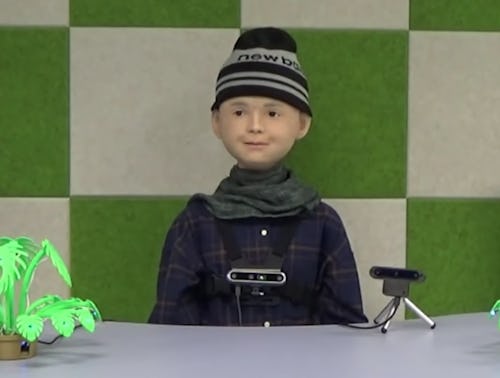
Robots capable of “expressing” human emotion are nothing new, and, more unfortunately, they appear here to stay. Yeah, sure, there have been some objectively impressive improvements in recent years, but it’s still going to be a long time before they finally cross the vast uncanny valley that results in their smiles reminding everyone of a serial killer’s more often than that of our new android BFF. And yet here we are, staring into the black wells that are Nikola the expressive child-bot’s eyes, wondering how in the hell the field of robotics managed to take so many steps into darkness while we weren’t looking.
Allegedly, the Japanese research institute-backed proof of concept from the Guardian Robot Project showcases some promising advances in the areas of individual human recognition and real-time emotional reactions to external situations. But it still looks more like a bald, disembodied robot-child’s head scanning the room for its next “flesh host” than a future tool for — and we wish were kidding here — elder care. Gaze into Nikola’s windows of nothingness below, courtesy of CNET:
We’ll stick with PenguinBot —
As useful as advancing robot facial expressions will be across countless fields, we don’t know if we’ll ever be able to shake the off-putting feeling of having to deal with mechanical smiles and eye-blinks (spare us your Philosophy 101, What is consciousness, though, really?, takes). In any case, for the time being we’ll just stick with designs like the Penta-X “penguin” robot that recently broke a jump-roping world record by racking up 170 hops in under a minute. Hell, we’ll even settle for one of these things over Nikola.
The faces of death —
The jokes about robots making silly faces are pretty endless, but they ignore the larger issues fomenting within the fields of artificial intelligence and machine learning. Take, for instance, the increased reliance on AI programs within military advancements and projects. Sure, the government likes to assure us that it spends a lot of time and energy researching how to make the “safest” possible killing machines, but... c’mon. You just can’t comfort someone in scenarios like this. None of those systems have anthropomorphic faces (for now), but those are certainly the ones we need to be looking out for more than little brat-bots like Nikola.







